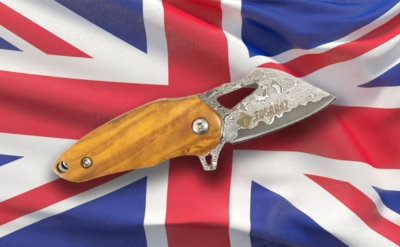UNITED STATES KNIFE LAWS
U.S. knife laws vary by state and sometimes even by city, but generally regulate the type, size, and carry method of knives. Common restrictions include bans on switchblades, ballistic knives, or concealed carry of certain blades. Some states allow open carry of almost any knife, while others limit blade length or prohibit carrying knives in schools or government buildings. Always check local laws for specifics, as penalties can vary widely.
UK KNIFE LAWS
In the UK, knife laws are strict and regulate the possession, sale, and carrying of knives. It is illegal to carry a knife in public without a valid reason, such as for work, recreation, or transport. Most knives, including folding knives, are allowed as long as the blade is less than 3 inches long. However, carrying a fixed blade or a lock knife without a valid reason is prohibited. Additionally, the sale of certain knives, like switchblades, is restricted. Offenders may face severe penalties, including fines and imprisonment.
AUSTRALIA KNIFE LAWS
In Australia, knife laws are stringent and vary across states and territories, aiming to enhance public safety and reduce knife-related crimes. Generally, it is illegal to carry any knife in public without a lawful excuse, such as for work, recreation, or a legitimate collection. Prohibited knives include switchblades, butterfly knives, and certain fixed-blade knives, with possession or use potentially leading to severe penalties, including imprisonment. Additionally, some states have specific regulations; for example, Queensland requires retailers to securely store knives and restricts sales to individuals over 18. It's crucial to be aware of and comply with local laws regarding knife possession and carry to avoid legal repercussions.
What Size Knife is Legal to Carry in Australia? A Comprehensive Guide to Knife Laws
FAQ about Knife Laws
1. Is it legal to carry a knife in public?
In most countries, it is illegal to carry a knife in public without a valid reason, such as for work, recreation, or transport. Carrying a knife with the intent to harm or in areas where it is prohibited, like schools or government buildings, is generally unlawful.
2. What types of knives are illegal to carry?
Prohibited knives often include switchblades, butterfly knives, ballistic knives, and certain automatic-opening knives. Laws may also restrict carrying fixed-blade knives or knives with blades over a certain length.
3. Can I carry a knife for self-defense?
Carrying a knife for self-defense is generally not allowed in many places, even if you are legally allowed to own one. In most cases, self-defense is not considered a valid excuse for carrying a knife in public.
4. Are folding knives legal to carry?
Folding knives are usually legal to carry, but this can depend on local laws. For example, knives that can be opened with one hand may be restricted in some regions. Always check your local laws to confirm.
5. What are the consequences of carrying a knife illegally?
The penalties for carrying a knife illegally can vary greatly depending on local laws, but they may include fines, confiscation of the knife, and even imprisonment. The severity of the penalty usually depends on the type of knife, the circumstances of the offense, and local regulations.
6. Can I carry a knife in my car?
Laws regarding knives in vehicles differ by location. In some places, carrying a knife in your car may be allowed, while in others, it could be considered illegal if you don’t have a valid reason for carrying it.
7. Are there any restrictions on owning knives?
Ownership laws are generally less strict than carrying laws, but certain knives (like switchblades or ballistic knives) may be prohibited or require special permits. In some cases, local laws may regulate the sale, possession, or transport of certain types of knives.
8. Do knife laws differ by state or country?
Yes, knife laws vary widely by country, state, or even city. It’s essential to familiarize yourself with the specific regulations in your jurisdiction before carrying or purchasing a knife.
9. Are there any exceptions to knife laws?
In certain cases, you may be allowed to carry a knife if you have a valid reason, such as for professional use (e.g., a chef or tradesperson) or recreational activities (e.g., camping or fishing). Always ensure that you are in compliance with local laws when doing so.
10. Can I travel with a knife across state or national borders?
When traveling, knives may be subject to different regulations depending on where you're going. For example, some knives may be prohibited from being brought into specific countries or across state lines. Always check for specific travel restrictions, especially when flying or crossing borders.






